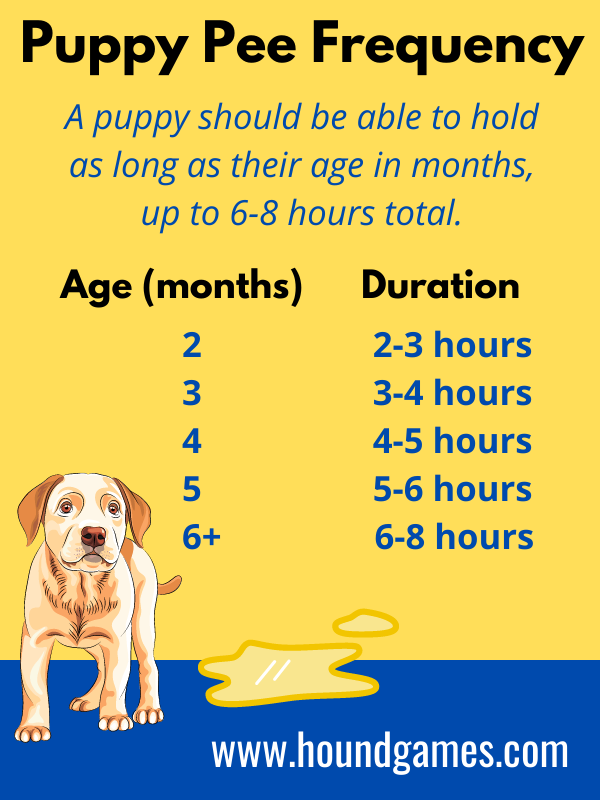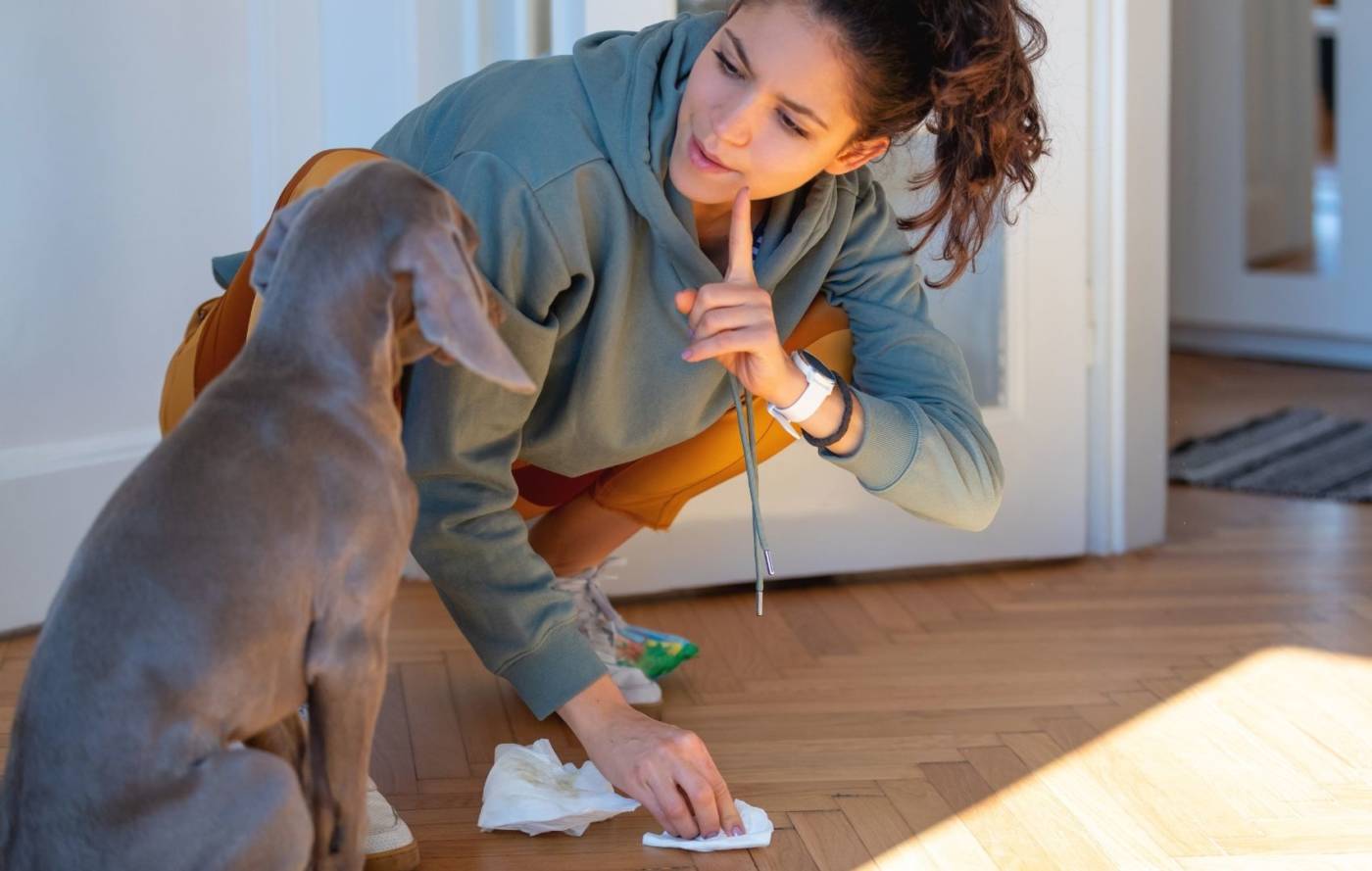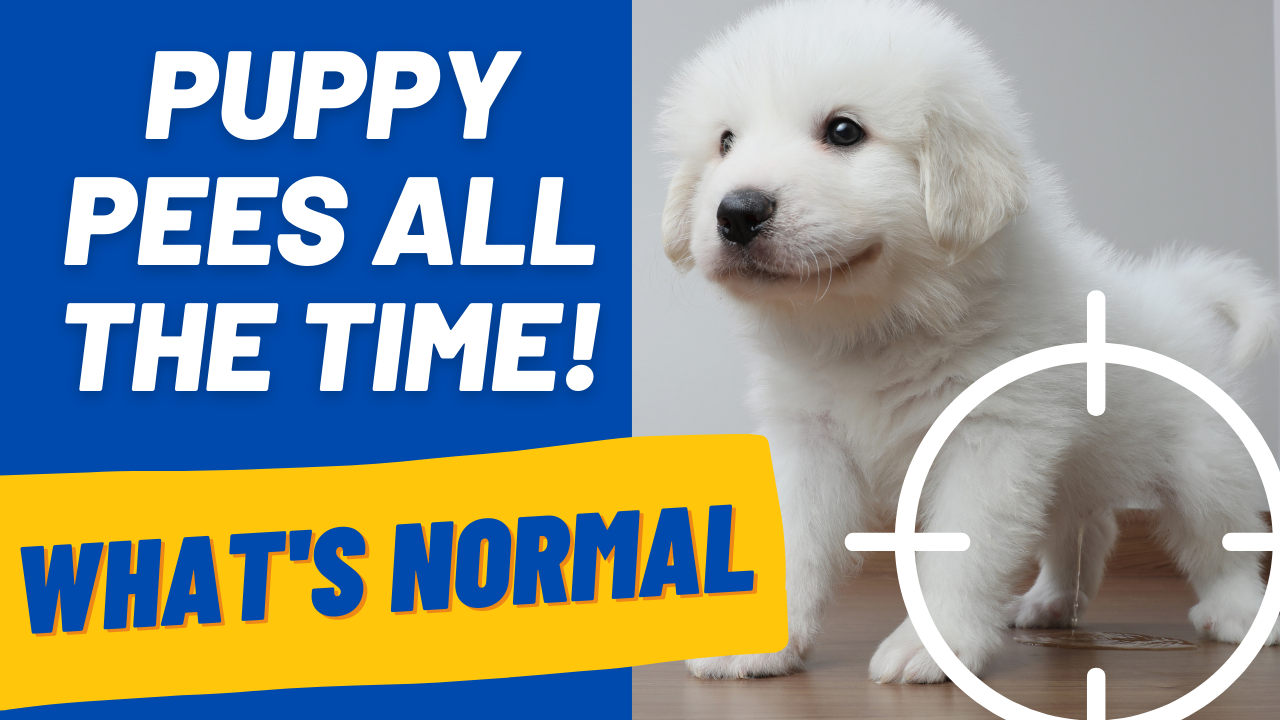We all know that potty training is a necessary part of raising a young puppy. However, it’s important to know what is normal peeing behavior when potty training a puppy. This can help you determine if you are dealing with a puppy that is peeing an abnormal amount, and if so, what to do about it.
As very young puppies (under 6 months) do not have complete bladder control, the occasional accident is to be expected. How many accidents are normal for a puppy will depend on their bladder maturity.
Accidents should decrease in frequency as the puppy ages and works through your potty training plan. If you are not seeing a reduction in accidents, or if accidents are getting worse, that’s a clear sign that you need to change the way you are potty training your puppy, or evaluate them for a medical problem.
Why is my puppy peeing so much?
Puppies have small bladders, without much bladder control. So, in many cases, it’s perfectly normal for puppies to pee more often than you would expect from an adult dog. The general rule of thumb is that your puppy should be able to go as long as their age in months, up to 6-8 hours total, without a bathroom break.
This means that a 2-month-old puppy usually needs to urinate at least every 2-3 hours, and a 5-month-old puppy every 5-6 hours.
You might like to read our post, Can You Toilet Train Your Puppy in Just 7 Days?

For most dogs, the maximum amount of time you should expect your dog to hold their bladder is 6-8 hours as an adult. Certain dogs, including those with medical problems, may not be able to hold their bladder as long.
As with puppies, senior dogs often also lose some bladder control and will need more frequent potty breaks.
A few factors affect how often your puppy may be peeing, though. If your puppy is active and playing, they will have to urinate more frequently than if they are sleeping. Once they wake up from a nap, however, that’s another time when most puppies need to head outside.
If your puppy has recently drank water or eaten a meal, they may also need to urinate sooner than normally expected.
Thus, while the average 8-week old puppy can go 2-3 hours without needing to urinate, this is also an average.
I brought home my dog Windi when he was 10 weeks old. At that point, he had been introduced to potty training and crate training by his breeder, but he was still a young puppy.
He slept through the night without an accident or whining to go out most of the time, with his last potty trip around 10-11 pm, and waking up and heading outside between 6-7 am. So, overnight, we often were able to go 7-8 hours without him needing a break.
During the day, when he was awake and playing, we went outside much more frequently. Until I started to learn his routine and signals, I tried to make a point of taking him outside for the opportunity to use the bathroom every hour at a minimum – sometimes every 20-30 minutes if he’d been active and drinking more water.
He was crated usually for 3-5 hours at a time during the day while I was at work and very rarely had an accident during that time frame.
So, while Windi was able to hold his bladder for some longer than expected times for his age, he also often needed trips outside more frequently than every 3 hours when he was being a playful puppy.
This is often the case for most puppies – certain situations (like naptime) may mean they can go a little longer without a potty break, but an active and playful puppy that is eating and drinking often needs a break sooner rather than later.
You might also like to read this post before you leave today, Puppy Won’t Poop Outside: Here’s What to Do
Why is my puppy peeing every 5 minutes?
It would be abnormal for a puppy to pee every five minutes. However, it’s best to determine the exact amount of time between toileting. It can sometimes feel as if only 5-minutes has passed when in reality it is longer. If your puppy is peeing every 5-minutes over a prolonged period of time, you should take them to your vet for a check-up.
Dogs and puppies that have a urinary tract infection will urinate often and in small amounts. Sometimes, you may even see your puppy squat to pee without leaving more than a drop or two behind – if anything at all. In this instance, please take your puppy to your veterinarian.
However, frequent puppy urination could also be caused by excitement, playing, and/or drinking lots of water (as long as 5-minute peeing is not continuing over long periods of time, then this is healthy behavior).
There is also the possibility that it feels like 5-minutes when it’s in fact over a longer period of time. When a client approaches me saying “my puppy is peeing every 5 minutes!” I first ask questions to find out if the puppy is actually peeing every 5 minutes, or if they are simply urinating more frequently than the owner expected.
It could be normal for a puppy to have gone to the bathroom 3-4 times over an hour. This is especially true if the puppy is running around and playing, getting hot and tired, and drinking water because they’re then thirsty.
I’ve also personally experienced a situation where it felt like my puppy was peeing often, yet it wasn’t an abnormal amount. After getting home from work, the puppy went outside to pee. Then I started cooking dinner while the puppy ran around and played, grabbed a few drinks from the water bowl, and then their bladder quickly filled up again as their body was moving things through due to the movement. This led to an accident as I was preoccupied with cooking.
After cleaning up the accident and taking the puppy outside to ensure they didn’t have to go again, I resumed cooking. As my rental house had a smoke detector in the kitchen, it would be set off almost any time the oven was on. Thus, the smoke detector was triggered, which led to another accident from the puppy as he was startled by a sudden loud noise.
At the moment, all of this felt like my puppy had to pee all the time. However, in reality, my puppy peed a normal amount for a young dog his age, especially considering he was being active, drinking water, and had gotten startled at one point.
You may be interested in reading our post: Puppy Still Not House-trained: Age expectations
Is it normal for puppies to pee every 10 minutes?
For a very young and small breed of puppy, it wouldn’t be out of the ordinary to see them pee after 10-minutes, depending on their activity and how much water they’ve consumed. This becomes even more true when your puppy is peeing every 30-minutes, which can be well within the norm for young puppies.
However, your puppy shouldn’t always be urinating within every 5, 10, or even 30-minute period. The occasional more frequently-needed bathroom break is to be expected. However, a puppy that is truly urinating every few minutes without being able to hold it is a puppy that should visit a veterinarian to rule out medical concerns.
To reiterate, more frequent potty breaks are to be expected for puppies that are active and playing, as well as puppies that have recently eaten or drank, and puppies that have just woken up from a nap.
However, if your puppy can’t hold their bladder for naps or moments of rest, you should rule out a medical problem before pursuing potential problems with your potty training plan itself.
You might also like to read our post, How to Stop Your Dog Peeing on the Furniture.
How often should a young puppy pee?
The general rule of thumb is that a puppy should be able to hold their bladder for the number of hours that equals their age in months, plus one. So, a 2-month-old puppy can go 2-3 hours, and a 6-month-old puppy can go 6-7 hours.
This maxes out at 6-8 hours for adult dogs, as asking them to hold their bladder for longer is unfair and can lead to problems for dogs that are well house trained and refuse to potty inside unless absolutely necessary.
This general rule of thumb can also be considered an average, with some puppies able to go longer without a bathroom break overnight or when they are resting. Most puppies will be able to hold their urine longer when they haven’t been active, running around, eating, drinking, or have just woken up from a nap.
I often like to start potty training by setting a timer to take my puppy out every 30-60 minutes at first. After that, I can adjust to longer periods of time once I know my puppy’s schedule and can pick up on the signs that they have a full bladder and need to head outside.
When do puppies stop peeing so much?
Puppies should have full bladder control by 6-months old. You should see very few accidents by this age unless your puppy is dealing with a medical problem or a severe behavior problem. Sometimes, as is the case for puppies raised in unclean environments (such as puppy mills), the puppy can unlearn their natural desire to keep their sleeping area clean.
Puppies that have come from a puppy mill or a similar situation in regards to the cleanliness of their environment will often require a much more strict potty training plan than a puppy that still has those natural desires in place.
However, it’s also frequently the case that your puppy is peeing a lot more than expected because they are suffering from a urinary tract infection, a congenital urinary tract disorder, or another medical problem. Thus, puppies that pee more than expected should always see a veterinarian to rule out something more serious than a training plan error.

Puppy peeing a lot suddenly
A puppy that goes from doing well on potty training to peeing a lot more than normal is exactly the kind of puppy that I would send to a veterinarian before seeking help from a dog trainer. Sudden increases in urination, especially in the absence of an environmental change (like a change in homes or in your job schedule), is one of the earliest signs that your puppy is dealing with a urinary tract infection.
Veterinarian Comment
In addition to urinary tract infections, other medical concerns could cause your pet to pee very frequently including bladder stones and vaginitis.
Bladder stones are not very common in young puppies, but not impossible. Vaginitis can also cause a puppy to urinate more frequently. As mentioned, if your puppy is persistently urinating frequently, or straining to urinate, it’s time to see your veterinarian!
Dr Marti Dudley
If your veterinarian is able to rule out medical problems, and you are still dealing with a big increase in accidents in your home, it’s time to either seek a second veterinary opinion or to seek a professional dog trainer or behaviorist. It’s important to get on top of the problem before it becomes any more difficult to correct.
How to tell if your puppy has a UTI
Dogs and puppies that have a urinary tract infection will urinate often and in small amounts. Sometimes, you may even see your puppy squat to pee without leaving more than a drop or two behind – if anything at all.
Other signs of a urinary tract infection include blood in the urine, discolored urine, urine with a foul-smelling odor, or a puppy that appears to be in pain when urinating. If you notice any of these symptoms in your puppy, it’s time to schedule a veterinary visit.
Even if you are unsure if the increased frequency is due to a medical problem, it’s best to rule it out before pursuing behavior change plans. Anyone who has had a UTI will tell you they are not comfortable, and it’s not fair to put a puppy through a potty training plan when they’re suffering from a painful medical concern instead. Plus, left untreated, UTIs can lead to worse problems down the road.
Your puppy might smell like metal if they do, in which case you will want to read, Puppy smells like metal? (Causes and Concerns).
Peeing a lot when excited
You may find that your puppy pees more than expected because they are excited. This often occurs when your puppy is greeting a new person or dog. Excited urination is to be expected on occasion in puppies, and often resolves with age.
If your puppy is older, around 5-6 months, and you’re still seeing urination with excitement, it’s time to rule out a medical problem, and then to work with a professional dog trainer for help.
Oftentimes, puppies that are peeing with excitement benefit from training that encourages them to be calm, to greet people in a structured manner, and to learn how to regulate their emotions in order to better hold their bladder.
If you have a Labrador that pees a lot, you might like to read our post: Why Your Labrador Puppy Pees So Much




